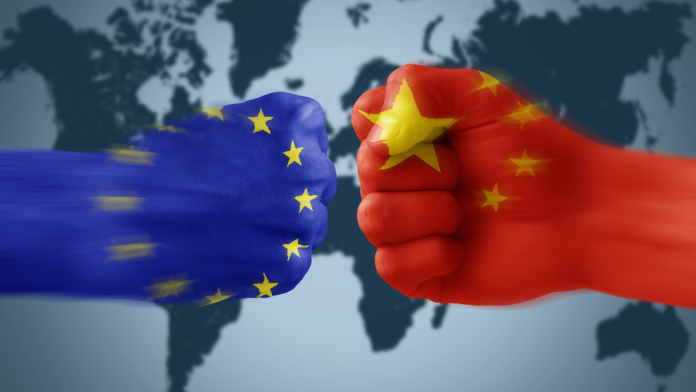China has taken strong action against two European Union banks, in a move that signals rising tensions between Beijing and Brussels. The measures were announced by China’s Ministry of Commerce on Wednesday, after the EU imposed sanctions on two Chinese financial institutions.
The targeted banks are UAB Urbo Bankas and AB Mano Bankas, both based in Lithuania. According to China, these banks are now banned from conducting transactions or cooperating with individuals and organizations in China. The measures are effective immediately.
China described the EU sanctions against its banks as “groundless” and called on the EU to “correct wrongdoings”. The Ministry of Commerce said it hopes Brussels will protect long-term economic and trade relations with China rather than undermine them.
China’s Retaliatory Measures
The EU sanctions, which came into effect on August 9, targeted Heihe Rural Commercial Bank and Heilongjiang Suifenhe Rural Commercial Bank, accusing them of supporting trade with Russia in violation of EU restrictions. China has repeatedly denied these allegations, calling them baseless.
China Retaliates: Imposes Sanctions on Lockheed Martin and other US Defense Companies
In response, China has added the two Lithuanian banks to its countermeasure list. The ministry stated that the banks, along with their individuals and organizations, are restricted from any form of business cooperation in China.
While the statement referred to the banks as “EU financial institutions”, it did not single out Lithuania by name. Beijing had warned the EU earlier that sanctions against Chinese banks would be met with retaliation, marking a rare instance of a direct financial tit-for-tat between China and the EU.
A European Commission spokesperson confirmed that Beijing notified Brussels of its plan to impose these sanctions on August 12. The EU said it will study the measures carefully before taking any further action. It also expressed willingness to explore solutions that could lead to the banks being removed from China’s blacklist.
Background of the Dispute
The tensions come amid growing friction over Russia’s war in Ukraine. The EU has pressured China to use its influence on Moscow to help resolve the conflict. Beijing, however, maintains close ties with Russia, describing the relationship as a “no-limits” partnership, while continuing to advocate for a political settlement in Ukraine.
Lithuania’s role has added another layer to the tension. In 2021, Vilnius allowed Taiwan to open a representative office under its own name, which China viewed as violating the “One China” policy. Since then, Beijing’s relations with Lithuania have been strained, and the sanctions against the two banks can be seen as part of this broader diplomatic disagreement.
The EU’s sanctions against Chinese banks marked the first time the bloc targeted Chinese financial institutions over alleged involvement in Russia-related transactions. The move is part of Brussels’ broader efforts to tighten economic pressure on Russia and its trading partners.
China’s lithium price soars after battery giant CATL suspends production at Jianxiawo mine
Impact on China-EU Relations
The sanctions and countermeasures come at a sensitive time for trade and diplomacy. European Commission President Ursula von der Leyen described trade ties with China as hitting a “clear inflection point” after a recent summit in Beijing. Talks between EU and Chinese officials highlighted both commercial disputes and concerns over Russia’s war in Ukraine.
China’s retaliation signals a willingness to defend its banks and financial system against foreign restrictions. Meanwhile, the EU faces the challenge of maintaining its sanctions on Russia while managing complex economic ties with the world’s second-largest economy.
The ongoing disputes over banking sanctions add to other trade tensions, including disagreements over tariffs on Chinese electric vehicles and levies on EU goods. These issues, combined with sanctions related to Russia, underline how quickly economic relations between China and the EU can become strained.
With the EU preparing new sanction packages targeting Russia and its trading partners, the conflict between financial regulations, trade interests, and geopolitical alliances is likely to remain at the forefront of China-EU relations.


